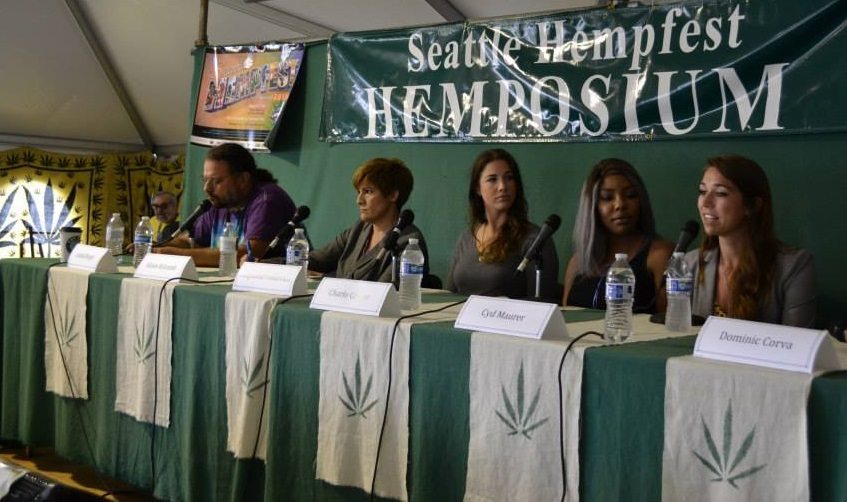
Seattle Hempfest was my first-ever cannabis related event after getting fired as a local news anchor for using marijuana. I was the victim of cannabigotry and after coming out with my story, I was invited to speak about my experience on a panel among some pretty impressive people. The panel took place on the Ric Smith Hemposium Stage and was titled: Cannabigotry: We Legalized, Why Are We Still Fighting?
Each speaker was asked to define cannabigotry as they understood it. I define cannabigotry as treating someone differently simply because they use cannabis. In my experience, I lost my job as a local news anchor for using marijuana in my free time, even though I would have kept my job had I chosen to use alcohol and pharmaceuticals. To me, that is a perfect example of cannabigotry: I was punished for using a safer substance than the socially accepted vices.
In the picture above you can see the rest of the panel included Charlo Greene, a fellow former news anchor whose story went viral when she quit live on the air to focus on legalizing marijuana in Alaska; Stephanie Viskovich, a medical marijuana activist in Washington State; Allison Holcomb, the leader of Washington State’s I-502 marijuana legalization campaign; and Leland Berger, a longtime Oregon cannabis advocate and attorney. Needless to say, I was very honored to be at the same table as these experienced activists.
I really enjoyed the discussion because we all brought very different ideas into the conversation. Mine and Charlo’s stories have a lot of parallels, but one of the examples she brought up about cannabigotry had nothing to do with employee rights. Her example had to do with cities within Alaska trying to block marijuana legalization less than a week after the majority of Alaskans voted Measure 2 into law.
Oregon is experiencing the same thing right now, and it is very disheartening. I really appreciated that Charlo made this point because it is yet another example of why social change needs to come first. The only way laws and policies are going to continue to change for the better is if people are exposed to the truth about cannabis.
Stephanie Viskovich was clearly passionate about the rights of medical marijuana patients in the state of Washington. She spoke about the cannabigotry they’ve experienced before and after recreational legalization in Washington. Allison Holcomb spoke about the racial history of cannabigotry, saying that the system has been set in place to fundamentally hold back minorities. And Leland Berger was able to give a very experienced look at the matter from his work as a trial attorney. He’s seen cannabigotry play out in real life time and time again, and his opinion was powerful.
Everyone brought examples of cannabigotry to the table. While this made for great discussion, it also really shows that the initial question that the panel proposed, We Legalized, Why Are We Still Fighting? is still a necessary and continuing discussion. While marijuana is legal in Oregon and a handful of other states, it seems like the battle to true freedom is still being fought.
Throughout the panel, I continued to voice my opinion that the most important thing for change is to keep talking about it. Keep talking about marijuana, its effects, and its many uses. Every time I made this point, it seemed as though everyone on the panel agreed. Regardless of our different viewpoints, it is glaringly clear that the conversation must continue.
At the end of the panel, Leland Berger said: “I want to end on a very positive note. If you’re 35 or younger, 80% of you get it on social issues. If you’re a young person, you’re going to be okay.” Leland is right. The vast majority of young people, and many others, agree that responsible adults should be able to live their lives the way they want to. It’s time to stop being the silent majority. Once again, if you can speak up, you should.







